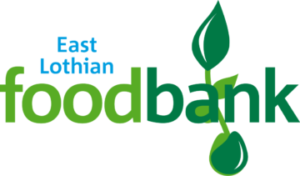The full report and the executive summary is available for download.
Key findings on the circumstances of people referred to foodbanks
- Financial and food insecurity: Almost half of households reported their incomes were unsteady from week-to-week and month-to-month. 78% are severely food insecure (meaning they had skipped meals and gone without eating – sometimes for days at a time – in the past 12 months), while over half could not afford heating or toiletries
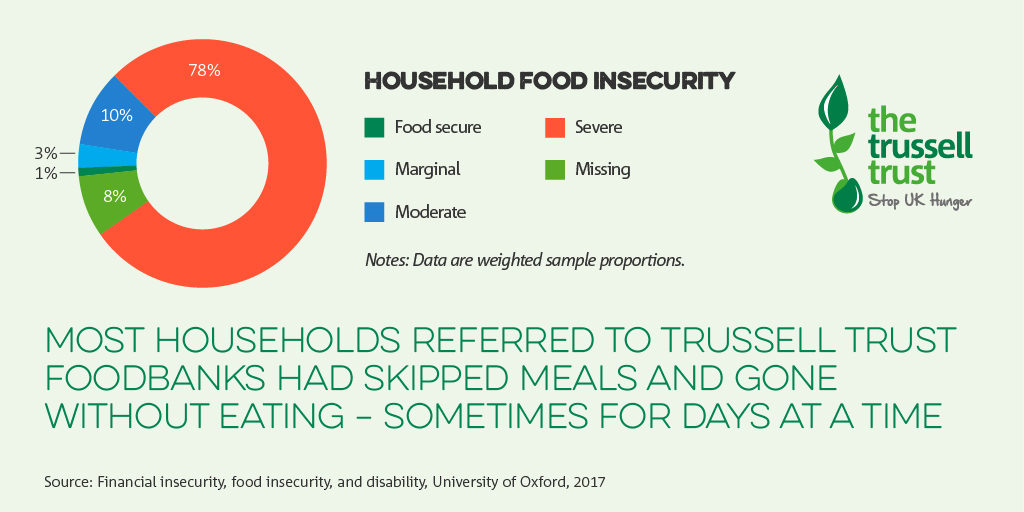
- Price rises: 3 in 5 households had recently experienced rising or unexpected expenses, with 25% of these saying higher food expenses were to blame, confirming the impact of food inflation on squeezed budgets
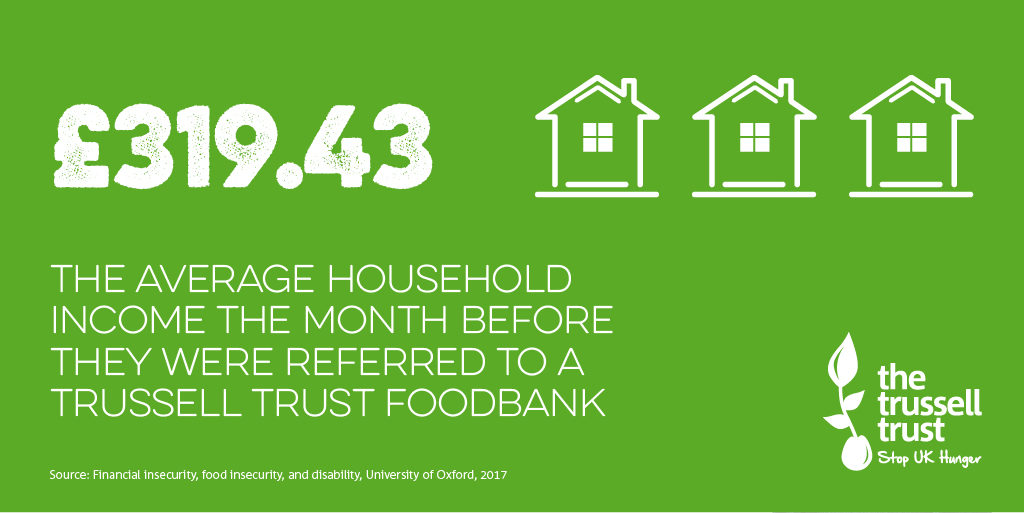
- Housing: 28% of those who had experienced rising expenses said this was due to housing costs, such as rent or energy, going up. Tenants in private housing were more likely to find it difficult to keep up with rents than socially rented properties
- Disability and mental health: Over 50% of households included a disabled person, consistent with the definition used in national surveys. 75% experienced ill health in their household. Mental health conditions affected people in 1/3 of households
- Debt: 1 in 3 households were finding it difficult to make minimum monthly repayments on outstanding loans, and nearly 1 in 5 in debt owed money to payday lenders
The report found people were experiencing multiple forms of destitution. 50% had gone without heating for more than four days in the past 12 months, 50% couldn’t afford toiletries, and 1 in 5 had slept rough in the last 12 months. Over 78% of households were severely, and often chronically, food insecure.
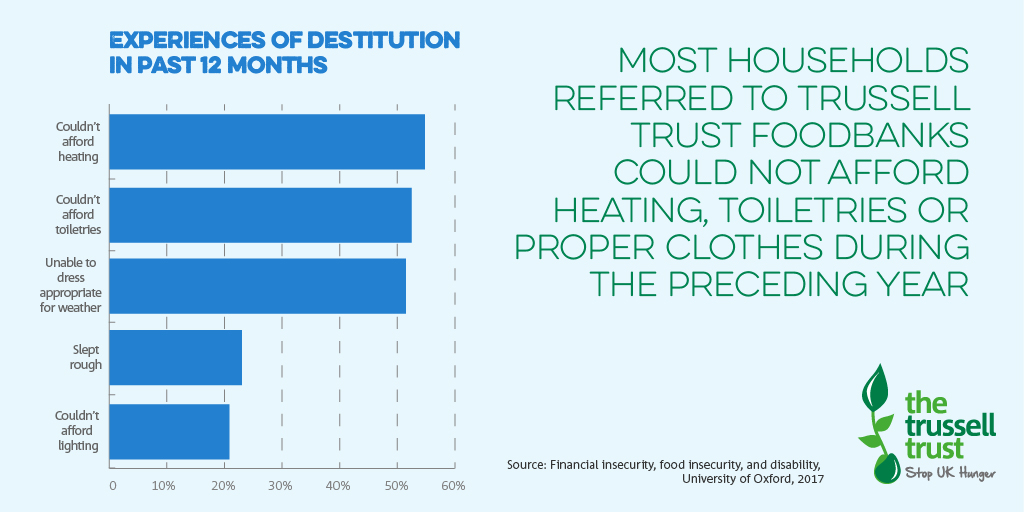
Key findings on drivers of foodbank use
Almost all households had experienced a drop in income in the past three months, unsteady incomes, or an unexpected expense or rise in expenses in the past three months.
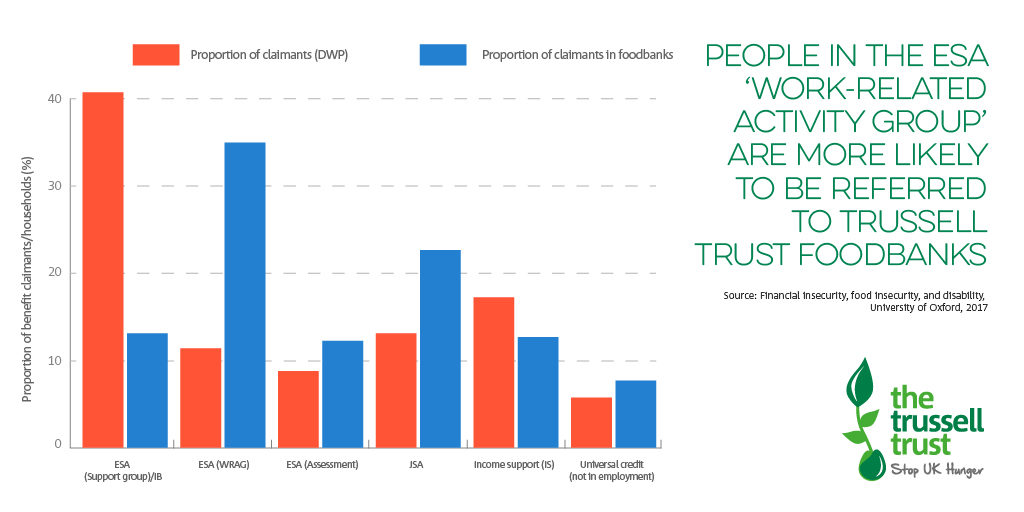
- Benefit delays: Nearly 2 in 5 people were awaiting a benefit payment, with most of these waiting up to 6 weeks, though a fifth were waiting 7 weeks or more. A third of delays were for Employment Support Allowance payments, with people assessed as capable of taking steps to move into work in the future particularly at risk of needing a foodbank
- Income shocks: 2 in 3 people had been hit by a recent ‘income shock’, with most experiencing sharp rises in housing costs or food expenses
- Low income: The average income of households in the month before being referred to a foodbank was reported at around £320, with 20% of households still needing to pay housing costs. This falls well below low income thresholds, before and after housing costs, and is a fraction of the national average. 16% had no income at all in the last month
The Trussell Trust is calling for a renewed commitment to halving the disability employment gap through a Work, Disability, and Health Bill, and for this commitment to include a review into the financial support provided for people who are in the ‘work-related activity group’, on Employment Support Allowance.
About the project
This report was a collaborative project between researchers at the University of Oxford, King’s College London, and The Trussell Trust Foodbank Network. It was jointly funded by the ESRC Impact Acceleration Account at the University of Oxford and The Trussell Trust. The research was designed and facilitated by Rachel Loopstra and Doireann Lalor, with support from Trussell Trust staff. A random sample of foodbanks was invited to participate in the study. This report is based on data from the first 18 participating foodbanks, which were trained to implement and facilitate data collection in their own distribution sites. Foodbanks were in England, Scotland, and Wales. Over four-week data collection periods, foodbanks recruited a total of 413 households. This reflected a response rate of 71% of eligible households asked to participate. The full report on study findings and a technical report are available as free downloads.
